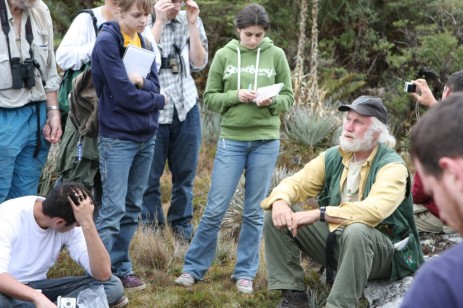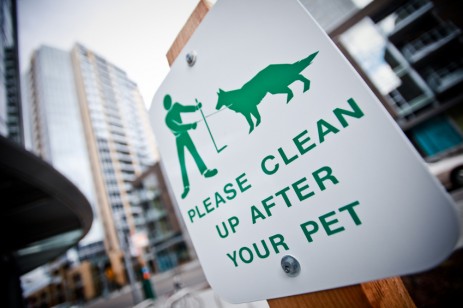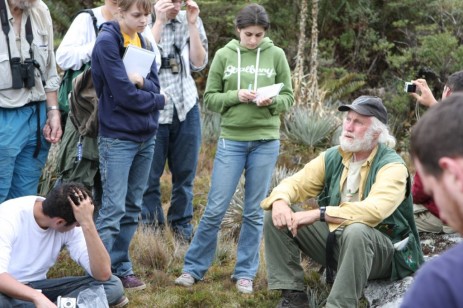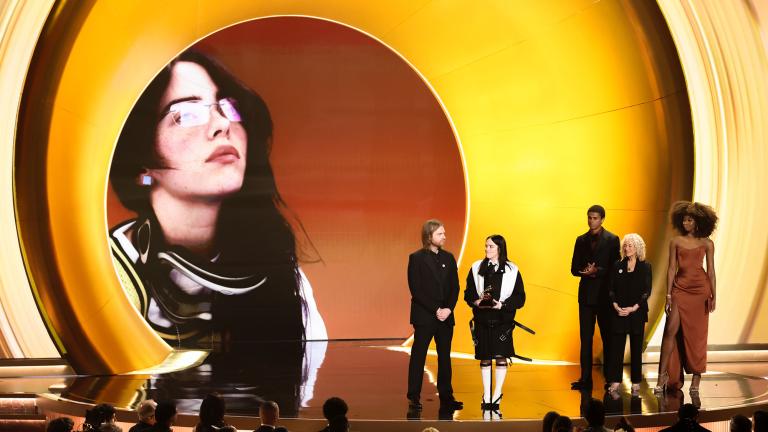I took Environmental Studies 101 during my first college semester 20 years ago with Dick Andrus, a professor who has just marked 36 years of teaching at Binghamton University. I thought it’d be good to check back with him and see what he’s talking about in that class now.
Q. What are your new Envi 101 students like? They coming to the class more ‘eco-savvy’ than my class did?
 Andrus at work: still planting seeds of wisdom after thirty-six years.Vic LamoreuxA. I don’t think so. They don’t seem to connect much with environmental issues. They’ve done a lot of computer gaming and television watching but very little camping and almost no hunting. And probably less than 1% have eaten roadkill! Though I do have one student who catches and eats squirrels at his apartment in Binghamton.
Andrus at work: still planting seeds of wisdom after thirty-six years.Vic LamoreuxA. I don’t think so. They don’t seem to connect much with environmental issues. They’ve done a lot of computer gaming and television watching but very little camping and almost no hunting. And probably less than 1% have eaten roadkill! Though I do have one student who catches and eats squirrels at his apartment in Binghamton.
Q. Used to be that you ended the last lecture with, ‘Well, that’s where we’re at: so either work to be part of the solution, or eat drink and be merry.’ How do you end it now?
A. My message is now more of ‘Good luck dealing with what is coming.’ I leave them with something between Bill McKibben and Derrick Jensen. From McKibben it’s how to get the best out of a less resource-rich world and with Jensen it’s we don’t have a choice but work to fix things.
Q. In 1989 you were critiquing corn ethanol, talking about climate change, and sustainable agriculture. What are you talking about now that’s similarly ahead of the curve?
A. It’s getting harder to get ahead of the curve without crashing going around it. But my corn ethanol critique is getting stronger, more along the lines of it being the stupidest idea for mankind but a great idea for ADM and Cargill. I do a lot these days on food and what our eating habits do to us, our environment, and other people. I have also become quite critical about the “no-meat solution,” by trying to teach students that farming without animals (for dairy products and meat) is ridiculously unsustainable in our region. I also try and teach them “more power” is a bad solution and that power corrupts one’s relationship to the environment, a la Jensen and Draffan’s Strangely Like War critique of forestry.
Q. Years before I got there, you and some others persuaded the university to not build dorms in an adjacent woodland, which then became its enormous Nature Preserve. It’s now recognized as a jewel of the campus, a great ‘lab’ for ecological teaching and research with its mixed hardwoods, wetlands, and clearings, and also its trail complex makes for popular recreation. How rare is this asset relative to other colleges?
A. With several purchases since you were here, we now have about 700 acres of undeveloped land as part of the campus. From the results of an independent study a few years ago we now know that this is the biggest, and probably most diverse, such [campus] preserve in the U.S., and it is used all the time by countless students and locals. As a result of a very generous endowment, we even have a Steward of the Natural Areas who does field trips, habitat management, trail upkeep, invasive species removal, and even teaches a natural history course.
Q. What have some of your students gone on to do that you’re happy about?
A. How about becoming Mayor of Binghamton? Matt Ryan was an Environmental Studies major. He’s been very supportive of environmental initiatives like shade trees and community gardens — a huge change for the city. Then there are the organic farmers — several have stayed local and their farms have become destinations for the [Ecological Agriculture class] field trips that they once took themselves!
Q. Still biking to campus every day?
A. Not much. I’ve fallen into the habit of driving my little pickup truck, which I use to scavenge lumber, firewood, compost material, etc., on my way to and from school.
Q. What new environmental courses are you offering now?
A. I’m teaching my third round of Environmental Literature, in which many of the books are by writers who regularly appear in Orion magazine. I do a mix of fiction and non-fiction, and I think some of the fiction offers a better take on our situation than non-fiction. I especially like World Made by Hand by James Kunstler, The Memory of Old Jack by Wendell Berry, Galapagos by Kurt Vonnegut, and Amitav Ghosh’s The Hungry Tide. Oh, and anything by Barbara Kingsolver!
Q. If you had unlimited time and resources, what’s one course you’d like to offer? Cryptozoology, maybe?
A. Plant psychology! And what’s so funny about cryptozoology? Actually I’d like to have the time to teach mosses again but I don’t see that happening. Just too many higher priorities. I’ll be happy if I can just hang onto Envi Lit.
Q. You’ve been taking students to Costa Rica for the lab portion of your tropical forest ecology class for about 20 years now. How are the studies and restoration efforts on that degraded piece of former grazing land going?
The restoration project is called the Tropical Forestry Initiative and every July I take about 15 students there for a month, where we learn tropical ecology and do real conservation work planting trees and erosion control plants. We’ve gotten more & more involvement from the locals; our original plantings are quite large trees now, and the wildlife is moving back in. We’re expanding our interest a bit into more sustainable food production and have several thriving and tasty tilapia populations.
We plant mixed stands of native species (Wes Jackson’s approach of using nature as a model) that includes legumes, some faster growing trees, some with more valuable wood, some better near streams, some slow growing. And we’re now working on mixing in fruit trees as an added incentive to the locals (who might want income and food) and to gringos (who are attracted to the idea of trees that attract birds, monkeys, etc.).
Q. What’s your prognosis for the ‘environment’ and for humans? Think we can figure out a way to have both?
A. That’s a huge question. We’ve spent a long time and tremendous amounts of energy digging the hole we’re in and we still haven’t stopped digging! The climate question trumps all, of course, as we still have only a dim idea of how that will play out. After teaching for 36 years that we need to do something serious to prevent a major disaster, and then seeing us do little except the same thing, it’s hard to be a real optimist. I have almost no sense of how it will play out.




